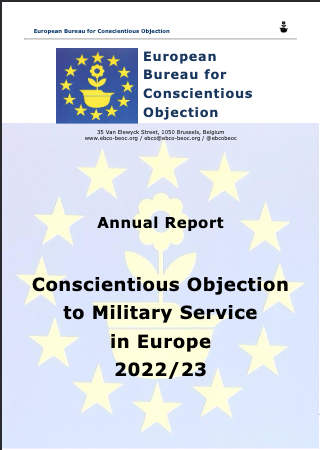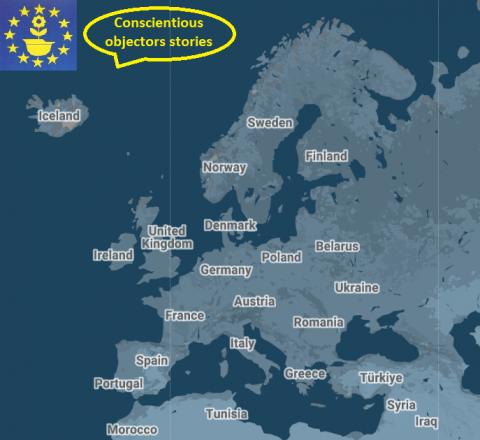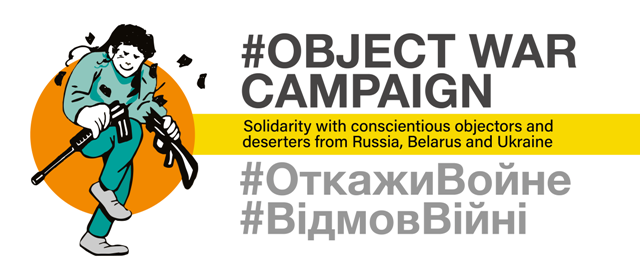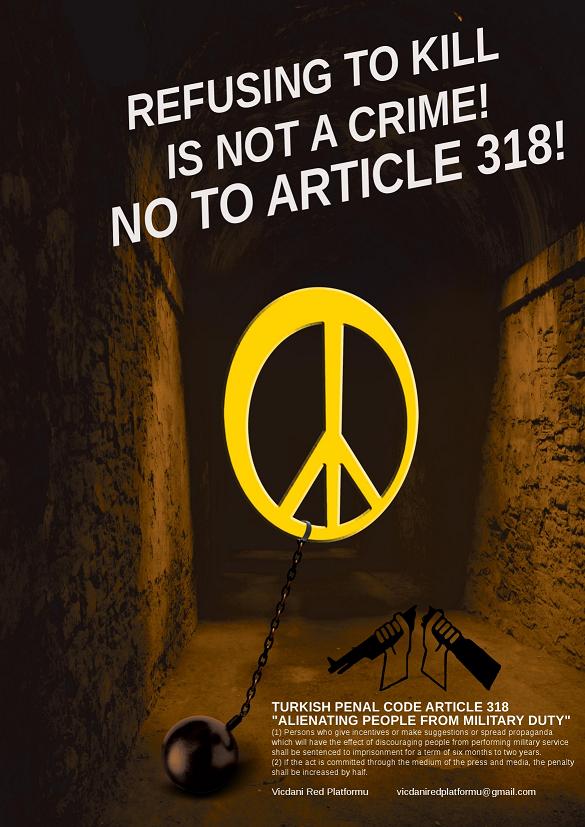Submission by the European Bureau for Conscientious Objection (EBCO) to the UN Universal Periodic Review 11th session of the UPR Working Group, May 2011
| download pdf |
GREECE
In this submission, the European Bureau for Conscientious Objection provides information under sections B, C and D as stipulated in the General Guidelines for the Preparation of Information under the Universal Periodic Review.1
Brussels, 8 November 2010
Submitting stakeholders: Mr. Gerd Greune (President of EBCO), Ms. Alexia Tsouni (Secretary General of EBCO).
Keywords: Conscientious objection, freedom of conscience, human rights, civilian service, military service, conscription, Ministry of Defence, committee, violations, discrimination, prosecution, refugees, political asylum.
B. Normative and institutional framework of the State
(1) In 1997, Greece was by 19 years the last of the then members of the European Union to accept conscientious objection to military service and make a substitute service available for conscientious objectors by Law 2510/1997. Law 3421/2005 and recent Law 3883/2010 have amended some of the provisions of Law 2510/1997, but in many respects still the law falls far short of international standards.
(2) In specific the European Bureau for Conscientious Objection has particular concerns regarding the following issues: 1) The examination of the applications and the assessment of persons applying to perform civilian service still remain under the jurisdiction of the Ministry of Defence. This is in breach with the principle that states should establish independent and impartial decision-making bodies to consider applications based on conscientious objection; 2) The duration of the civilian service remains punitive in nature Currently the civilian service is double longer than the military service, and in the best case it could become 14 months by ministerial decision, while the military service for the vast majority of the conscripts is 9 months. Other conditions of civilian service are also largely problematic (to be served far from the conscientious objector's home area, not in a series of major cities, and without adequate financial support);
3) Lack of adequate information on the possibility of applying for recognition as a conscientious objector (nothing written in the call-up papers); 4) Strict time-limits for the submission of any application for recognition as a conscientious objector, accompanied by all the required documentation which is difficult to be acquired. Applications must be received at the latest on the day set for enlistment, with no postponement permitted. Over the years, this has meant that some applications have in practice been rejected on purely procedural grounds, without being considered on their merits; 5) Restrictive definition of conscientious objection and arbitrary refusal of recognition. Excluded, for no logical reason, is anyone who has ever held a firearms license (applicants have to provide a certificate from the police showing that they have never done so), or been a member of a hunting club, or participated in shooting sports, or been sentenced for crime related to use of guns, ammunition or illegal violence or even are currently prosecuted for such crime (which is anti-constitutional, in violation of the presumption of innocence); 6) Possible revocation of the conscientious objector status for several reasons (for example if he participates in a strike or trade union activities).
(3) According to Article 202 of the Greek Penal Code “Inciting those who have duty of military service”: 1) Whoever in whatever way induces or incites on purpose a person serving in the army to disobey duty of service shall be sentenced to imprisonment for a term of up to three years; 2) The same sentence is imposed on whoever induces or incites on purpose a person who has duty to enlist to disobey the call-up to the army; 3) In time of war, armed revolt, or general mobilisation, the above sentence may be increased to up to ten-year imprisonment; 4) The above penalties apply only if the offence concerned is not subject to more severe penalties under another law. EBCO is disturbed at the potential for using this article to punish or deter discussion of the right to conscientious objection to military service, something that would constitute a restriction on freedom of expression.
C. Promotion and protection of human rights on the ground
(4) The application of the system in practice has been marked by discrimination between conscientious objectors on the grounds of religious adherence. According to the statistics provided by the Greek Ministry of National Defence during a meeting with NGOs on 2nd December 2009, between 01/01/1998 (when the first law on civilian service entered into force) and 31/12/2008, there were 1425 applications for civilian service; 1395 on religious grounds and 30 on other grounds. 1402 applications were accepted; 1388 on religious grounds and 14 on other grounds. 23 applications were rejected; 7 on religious grounds and 16 on other grounds. In the latest three years available, the figures for acceptances had been: in 2006 on “religious” grounds 102 of 102 and on “ideological” grounds 0 of 2, in 2007 on “religious” grounds 174 of 174 and on “ideological” grounds 2 of 4, in 2008 on “religious” grounds 110 of 110 and on “ideological” grounds 1 of 2. This means acceptance rate on “religious” grounds 100% while on “ideological” grounds 37.5%. These statistics confirm the serious concerns about the lack of information on civilian service in Greece and the questionable opinions of a special committee in the Ministry of Defence which advises the Minister on the applications, especially on the ideological applications for civilian service. All fundamental beliefs are equally protected by the international standards on freedom of thought, conscience, or religion. To separate them into those deemed “religious” and “other” is a primary act of discrimination, even before the differential treatment of the two categories is taken into account. Indeed the question is thus raised of whether even the favourable decisions are really based on proof of the objection or proof of the denominational adherence of the applicant.
(5) There has also been continued prosecution of conscientious objectors and arbitrary refusal of recognition. On 31st March 2009, the Appeal Military Court of Athens found conscientious objector Lazaros Petromelidis guilty on two charges of insubordination, and sentenced him to eighteen months imprisonment. This represented a halving of the sentence handed down in absentia by the Naval Court of Piraeus in May 2008. Petromelidis had been left at liberty pending the appeal on payment of €7,000 bail. Execution of the latest sentence has been suspended until the hearing of his pending appeal to the Supreme Court, the highest domestic court. In 1998 Petromelidis had been recognized as conscientious objector and was asked to perform a civilian service of 30 months, 7.5 times the length of the military service for which he would have been liable; moreover the placement he was given was at a distance of 600 km from his residence place. He refused to perform such a punitive civilian service, thus under Greek law forfeited the right to a civilian service and was called up to perform military service. His refusal to do this had already resulted in two sentences of imprisonment. The previous convictions were 20 months suspended in 2003 and 5 months in prison in 2006. His appeals for both convictions to the Supreme Court were rejected. All in all Petromelidis has experienced 16 trials at Greek military courts.
(6) On 18th February 2010, the appeal was heard against the third conviction of Giorgos Monastiriotis. Monastitiotis, who had joined the Greek Navy on a five-year contract, refused, citing conscientious reasons, to follow his unit in May 2003 when the frigate "Navarino" on which he was serving was sent to the Persian Gulf. He is the first Greek professional soldier known to refuse to participate in the recent war in Iraq on the basis of his conscientious objection and to declare his resignation from the Navy for this reason in May 2003. On 13 September 2004 he was arrested and sentenced to 40 months' imprisonment for desertion by the Naval Court of Piraeus. He was taken immediately to prison in Corinth where he remained imprisoned for 22 days until his temporary release pending his appeal hearing. On 17 January 2005 he was sentenced again by the Naval Court of Piraeus to 5 months' imprisonment for a second desertion charge, because he did not return to his unit after his release. He appealed and was released until his appeal trial. On 15 March 2006 he was fired by the army. On 31 October 2006 he was sentenced by the Appeal Military Court of Athens to 24 months’ imprisonment suspended for 3 years for the first desertion charge. On 21 February 2008 he was sentenced again by the Naval Court of Piraeus to 10 months’ imprisonment suspended for 3 years for the third and last desertion charge, because he did not return to his unit after his second release. As a result of the latest appeal, the sentence for the last conviction was halved, and again suspended for three years.
(7) Whereas EBCO welcomes the shortening on appeal of the sentences handed down, and that the sentences are suspended so that Greece refrains from further imprisonment of these conscientious objectors, it must nevertheless be stressed that in the cases of both Monastiriotis and Petromelidis the multiple charges violate the principle of “ne bis in idem”, in accordance with the principle set out by the UN Human Rights Committee in Paragraph 55 of its General Comment No. 32, “Repeated punishment of conscientious objectors for not having obeyed a renewed order to serve in the military may amount to punishment for the same crime if such subsequent refusal is based on the same constant resolve grounded in reasons of conscience.”
(8) Friday 19th February 2010 saw the first court appearance of Evangelos Mihalopoulos, board member of the Greek Association of Conscientious Objectors who had refused to perform either military service, or, because of its punitive length, civilian service. He was given an eight-month sentence, suspended for three years.
(9) EBCO is disturbed also to note that the refusal to accept a claim of conscientious objection from anyone who has performed military service – unacceptable in itself - has been interpreted in a particularly restrictive and inequitable fashion. There were at least five cases in 2009 when conscientious objectors were refused recognition because during the recruitment process, and before their applications could be considered, they had been obliged for administrative reasons, and against their will, to spend a night in barracks, and were therefore deemed to have commenced military service although they had never accepted enlistment in any form.
(10) Moreover Greece has reportedly failed to protect conscientious objectors as refugees. One refugee case in Greece in 2009 concerned two sisters from Eritrea who had escaped forcible recruitment and abuse in the Eritrean army. Despite the ample evidence to the contrary (UNHCR etc) the tribunal chose to find that there was no known history of forced recruitment in Eritrea and also, despite the fact that their experiences had been shared, to disbelieve the girls because of the similarity of their stories. Another case which came to attention in 2009 concerned Ridvan Celik, born in Turkey on 2 March 1969, who had refused to serve his compulsory military service for reasons of conscience in September 1991 and was forced to flee Turkey for this reason. He then immediately asked international protection as refugee in Greece, according to the provisions of Geneva Convention (1951), explaining his situation in his application for political asylum to the Ministry of Public Order: "My name is Ridvan Celik. In September 1991 I was called up by the Turkish authorities to enlist in the army, in order to serve my military service in the Diyarbakır province (Southeastern Turkey – North Kurdistan), where, at that time, there were battles between Kurdish partisans and Turkish forces. Given that I didn’t wish to get involved as a soldier in these battles, which had taken on the dimensions of a civil war, I fled from my country three days after I received the call-up paper for performing my military service." However, on 27 January 1992, the Minister of Public Order rejected his application. On 24 August 2000 the Turkish authorities removed his Turkish citizenship. On 18 July 2002 Mr. Celik applied for residence permit in Greece on humanitarian grounds, but on 23 September 2002 he was informed that this application was also rejected. On 19 June 2003 Mr. Celik applied for status of stateless person, according to the provisions of New York Convention (1954). On 6th December 2009 Mr. Celik was arrested in Heraklion (Crete) as one of being in a group of 20 persons on their way to a demonstration on the anniversary of the killing of Alexandros Grigoropoulos by a policeman in Athens. He was the only one of the group whose detention was not temporary; his trial was set for the summer of 2010, but the police in Heraklion issued a deportation decision against him, and on 24th December 2009 he was transferred to the Attica Aliens Department. Following an international campaign, including an intervention by EBCO, Ridvan Celik was released on 30th December and permitted to lodge a further asylum claim, which is still pending.
(11) There are also concerns about the violence directed against conscientious objectors. On Tuesday 24th February, 2009 at around 10 pm, an attempt was made to throw a hand grenade through a window into a public meeting against the new armaments plan hosted by the Greek Association of Conscientious Objectors in the Migrants’ House at 13A Tsamadou Street in Exarchia, Athens. It was solely through the good fortune that only the outer panel of the window's double glazing broke and the grenade bounced back and exploded in the empty street that there were no injuries; had the grenade exploded in the room there could well have been fatalities. As it was some damage was caused to the pavement and windows in surrounding buildings were broken. It is not known whether the attack was specifically targeted at the Association of Conscientious Objectors; the building known as the Migrants’ House, also houses a number of left, feminist, homosexual and immigrant groups. A short time before the attack, the daily Greek language courses for non-native speakers, attended by dozens of immigrants, had been taking place. This attack was not the first one against conscientious objectors in Greece. The extreme-right Organisation of Young Noiseless Raiders attempted to put a bomb at the trial of conscientious objector Pavlos Nathanail in 1991, a total objector who was prosecuted because he refused to serve his military service. Also in April 2008, there was a bomb threat telephone call against a public event on conscientious objection organized by the Greek Section of Amnesty International, with the participation of EBCO, on the occasion of the ten-year anniversary of the law on conscientious objection. The latest attack was symptomatic of a general rise in right-wing pro-militarist violence. There are suspicions that the grenade used might have illicitly come from military sources. It is also disturbing that the police have had no success in attempts to trace the perpetrator.
D. Identification of achievements
(12) On April 22nd 2010, the plenary session of the Greek Council of State found that Evangelos Delis, who had served in the Greek army in 1992 but who subsequently converted to “being one of Jehovah’s Witnesses”, had the right to object to serving as a reservist in the military. When called up for reserve training, Delis requested that he be treated as a conscientious objector and, as such, be assigned to civilian service. This request was denied at first instance, on the grounds that a reservist did not have the right to make such a claim. Citing Articles 13 and 5 of the Greek Constitution, Articles 9 and 14 of the European Convention on Human Rights, and Article 18 of the United Nations International Covenant for Civil and Political Rights, on January 15, 2010, the Council of State ruled that regulations for conscientious objection must be read in such a way that a person has the right to change his religion even after having served in the military and has the right to claim conscientious objector status. This ruling ends one of the more blatant injustices of the Greek military recruitment system.
Recommendations for action by the State under review
(13) EBCO calls for immediate amendments to the Greek law and practice in order to stop the prosecutions of conscientious objectors and bring civilian service in line with the European and international standards and recommendations, which require, among other things, that: 1) individuals who object to compulsory military service on grounds of conscience have the opportunity to perform a non-punitive, non-discriminatory, genuinely civilian service of equal length to the one of the military service; 2) individuals, including members of the armed forces, be allowed to register as conscientious objectors at any time before, during or after their conscription or performance of military service, without any restriction before or revocation after they acquire the status of conscientious objector; 3) information on the status of conscientious objector and the means of obtaining such status be readily available to all those liable to be conscripted to the armed forces.










